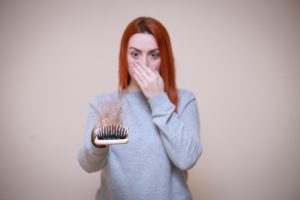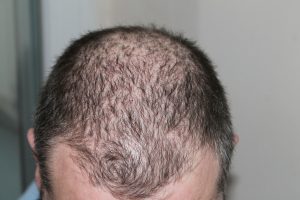 Have you noticed that your hair is thinner and less lustrous as you've gotten older? Maybe it’s prone to split ends and is always dried out.
Have you noticed that your hair is thinner and less lustrous as you've gotten older? Maybe it’s prone to split ends and is always dried out.
All these issues are probably linked to your stress level and mainly hair loss. Researchers from Harvard have found a link between chronic stress and hair loss. Read on to learn more!
Stress Hormone Inhibits Hair Follicle Activity
Some big players conducted the study described in this article. The researchers were from Harvard, MIT, Icahn School of Medicine at Mount Sinai in New York, Massachusetts General Hospital, and University Hospital Würzburg in Germany. The study was published in the journal Nature.
They found that a specific stress hormone called corticosterone inhibits hair follicle stem cell activity and hair growth.
Their subjects were mice, and they found that when corticosterone levels were low, hair follicle stem cells regenerated more frequently than when high levels were. When corticosterone levels were high, caused by chronic stress, the hair follicles actually entered a dormant phase.
 Follicle Stem Cells are Responsible for Hair Growth and Color
Follicle Stem Cells are Responsible for Hair Growth and Color
A researcher from Harvard, Ya-Chieh Hsu, mainly focuses on stem cells and tissues, emphasizing how stress impacts them.
In addition to the hair loss connection, Hsu also found that stress depletes melanocyte stem cells which produce the color of our hair.
Hsu stated, “We found that chronic stress, through up-regulation of the stress hormone corticosterone (the mouse equivalent of the human stress hormone cortisol), inhibits an activation signal (Gas6) in dermal cells surrounding hair follicle stem cells that normally promotes stem cell activation and hair growth.”
Yikes! We know that chronic stress is bad for our health, but it also affects our hair! Nobody wants to have thinning hair, especially if you’re still relatively young.
 Mice Were Subjected to Similar Human Stressors
Mice Were Subjected to Similar Human Stressors
The expert on psychosocial stress and cardiovascular disease in mice, Matthias Nahrendorf, helped to develop the best and safest way to replicate chronic stress in the mice.
There are multiple scientific models on how to accomplish this task so that it can be replicated and is scientifically sound.
Hsu and colleagues directly fed the mice corticosterone (the stress hormone) and exposed them to stressors.
These included isolation (similar to what we have experienced with COVID-19 restrictions), crowding (like living in the city), damp bedding, restraining, sudden changes in light, and more.
Even though some of these stressors are very similar to what humans can experience daily, leading to chronic stress, it is still up in the air how much we can take from these findings and translate them to humans.
According to Nahrendorf, the “major components” of the stress systems in mice and humans are “fairly similar,” but the real test is when humans are actually the subjects. However, deliberately subjecting humans to chronic stress may have some issues in the scientific community.
 At least it is safe to say that stress, especially chronic stress, is probably not something we want to experience for months or years.
At least it is safe to say that stress, especially chronic stress, is probably not something we want to experience for months or years.
It probably affects your hair and other essential bodily functions, such as digestion and cardiovascular health. Chronic stress is not something to mess around with.
Consider finding ways to de-stress daily and seriously evaluate the significant stressors in your life and how you can reduce their impact on your mental and physical health.
It’s incredibly important, not just for your hair, but for your overall health and longevity!
If you are having severe hair loss issues, such as increasing baldness as a male and lowering your stress levels is not helping, consider growth hormone treatments as they have been proven to increase hair growth!
Reference
Contact Us For A Fast And Professional Response

- Testosterone Therapy and the Heart. Is It Worth the Risk? [Last Updated On: October 5th, 2024] [Originally Added On: March 5th, 2021]
- 13 Natural Ways to Increase Longevity and Quality of Life [Last Updated On: January 14th, 2025] [Originally Added On: April 26th, 2021]
- Perimenopause is a Real Thing – and Women are Trying to Bring More Attention to It [Last Updated On: January 6th, 2025] [Originally Added On: May 18th, 2021]
- How to Limit Your Exposure to Phthalates [Last Updated On: April 4th, 2025] [Originally Added On: May 21st, 2021]
- Hormone Imbalance a Major Factor in “Brain Fog” Symptoms [Last Updated On: January 8th, 2025] [Originally Added On: May 24th, 2021]
- Can Drinking Alcohol Affect My Hormone Levels? Part 1 [Last Updated On: January 10th, 2025] [Originally Added On: July 28th, 2021]
- Ask the Experts: How Do I Live Longer? [Last Updated On: March 4th, 2025] [Originally Added On: September 21st, 2021]
- Crazy-Making Hormone Problems [Last Updated On: January 12th, 2025] [Originally Added On: October 5th, 2021]
- Why Does the Middle East Have the Lowest Cancer Rates Across the Globe? [Last Updated On: January 23rd, 2025] [Originally Added On: January 31st, 2022]
- More Muscle = Better Cancer Fighter [Last Updated On: January 22nd, 2025] [Originally Added On: March 15th, 2022]
- A Tale of Two Friends -- Hormone Deficiency Testimonials [Last Updated On: January 19th, 2025] [Originally Added On: March 30th, 2022]
- Poor Sleep Wrecks Your Hormones and Your Libido [Last Updated On: January 3rd, 2025] [Originally Added On: July 1st, 2022]
- Suppressing Hormones Can Improve Success Rate of Melanoma Treatment [Last Updated On: January 26th, 2025] [Originally Added On: August 7th, 2022]
- Blue Zones - Cultures of Longevity [Last Updated On: November 20th, 2024] [Originally Added On: November 23rd, 2022]
- Toe-Tapping Time [Last Updated On: February 3rd, 2025] [Originally Added On: November 30th, 2022]
- The Hormones That Affect Your Weight [Last Updated On: December 25th, 2024] [Originally Added On: December 12th, 2022]
- How Long Until HGH Benefits Kick In? [Last Updated On: February 26th, 2025] [Originally Added On: June 10th, 2023]
- Understanding the Timeline of HGH Benefits [Last Updated On: February 17th, 2025] [Originally Added On: February 17th, 2025]
- The Quest for a Longer Life: An Overview [Last Updated On: February 19th, 2025] [Originally Added On: February 19th, 2025]

















